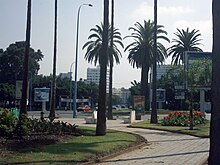Casablanca Group
The Casablanca Group, sometimes known as the 'Casablanca bloc', was a short-lived, informal association of African states with a shared vision of the future of Africa and of Pan-Africanism in the early 1960s.
[1] The group was composed of seven states led by left-wing leaders — Algeria, Egypt, Ghana, Guinea, Libya, Mali, and Morocco.
This conference brought together some of the continent's most prominent statesmen like Gamal Abdel-Nasser of Egypt, Kwame Nkrumah of Ghana and Sékou Touré of Guinea.
They believed that only significant, deep integration, as has since occurred in Europe through the European Union, would enable Africa to defeat colonialism, achieve peace, foster cultural dialogue, increase the continent's geopolitical influence and promote economic development.
Nkrumah even argued for the establishment of a pan-African army which could be deployed to fight colonialism or white minority rule across the continent.
